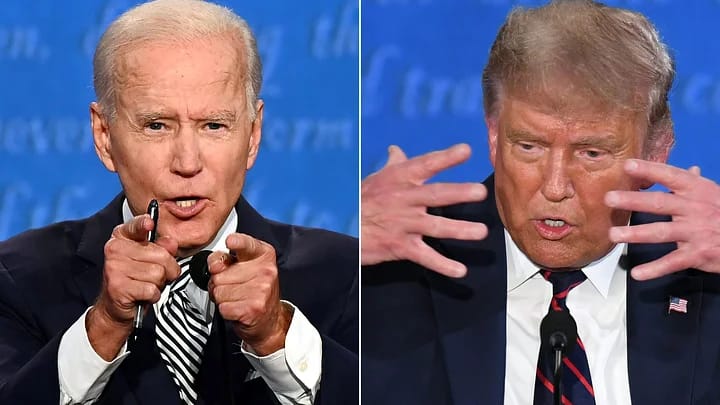
FAQs On US Elections

Biden-Trump face-off
The US elections are a little more than ten days away. The possibility of a change of leadership is indicated in the opinion polls, but things still remain uncertain.
The frequently asked questions at this point and their answers are the following.
1. How are the US elections 2020 different from the previous ones?
A: The US elections in 2020 are about leadership and the question is whether the present President has delivered and whether the alternative will be better. The ideological differences between the two parties are thin and there are many who swing between them, depending on their assessment of the incumbent and the expectations about the challenger. In the present case, the elections are a referendum on the style and performance of an unusual President, who defied traditional methods of decision making and implementation. In practice, it is a test as to whether a successful billionaire businessman can run the most powerful country in the world, with mere practical skills and without any political experience. It is a test whether the powers at play in his favour in 2016 still hold good in 2020.
2. What are considered to be the strong points of Trump?
A: Trump’s victory in 2016 was unexpected and there were mild protests even when he took over as he was far behind Hillary Clinton in popular votes. Then came a period of trial and error and some virtues of Trump’s approach were acknowledged and there was a sense of optimism. A decisive President without the hesitations of history and the strait jacket of a political agenda seemed to be effective even though it was a tough ride throughout his term.
Domestically, his policies were divisive, as they served to consolidate his supporters and made the minorities feel insecure. But the general economic growth, reduction of unemployment and scaling down of immigration created a positive impact. People began to feel that Trump was not a bull in the china shop and that there was a method in his madness. His support base grew in certain sections even as he infuriated other sections.
3. How was his performance in international affairs?
A: In international affairs, Trump’s biggest weakness was the charge that it was a conspiracy with Russia’s Vladimir Putin that brought him to power. This pursued him till his failed impeachment and denied him any leeway to improve relations with Russia. On China, he began with a charm initiative, but it soon turned sour and Trump initiated a trade war against China. The most dramatic initiative was with North Korea, which transformed the American position of total condemnation of the North Korean leader to a “friend” to whom Trump wrote love letters. The President of North Korea made use of the opportunity to strengthen his position, even while appearing to accept the denuclearisation of the Korean Peninsula.
Trump made a mistake in alienating the NATO allies and even Canada. He also encouraged Brexit and angered the European Union. He walked out of various agreements, treaties and commitments, reversing many of the changes that Barack Obama had brought about. He also brought the US to the brink of war with Iran and Iraq. His greatest diplomatic success was in the Arab world when the UAE and Bahrain recognised Israel with the support of Saudi Arabia.
4. How did Trump handle COVID-19?
A: Trump’s accomplishments in certain areas paled into insignificance when COVID-19 struck the world. His approach to the pandemic was unscientific, reckless and irrational. The US could have done better and saved thousands of lives and vital livelihoods if only the President had followed scientific advice and public opinion. The blood of the many victims of COVID-19 is on his hands and the situation was further compounded by the economic crisis and racial conflict. His standing, which rose after the defeat of the impeachment proceedings plummeted and today he is at least 10 points behind Joe Biden in opinion polls. The disastrous first Presidential debate and his handling of his infection worsened the situation. His return to campaign without a mask has made him a super spreader himself. Biden’s choice of Kamala Harris as his running mate also made some dent in his popularity.
5. What is the position of the Indian Americans in the election?
A: India and the Indian Americans are of marginal significance in US election, but they have come on the centre stage because of the impression that Trump had been good to India and that many Indian Americans had moved from their traditional Democratic moorings to vote for Trump because of the Modi-Trump relationship and Modi’s open support for Trump a year ago. “Mr. Modi may be popular in India, but the so-called Modi effect elsewhere is mostly a myth,” says the Wall Street Journal. Trump was no more friendly to India than his predecessors, except when he calculated that he could derive economic or political benefits for the US and himself personally. It was an opportunistic posture, liable to be abandoned in the next tweet. His immigration policy has left thousands of Indians in the lurch.
The latest estimate is that only 22% of registered Indian American voters plan to vote for Trump, while 72% intend to vote for Biden. In a recent survey, about 70% of Indian Americans disapproved Trump’s handling of the Presidency. Many of them felt that the Republican Party is intolerant towards minorities. Its immigration policy and the state of the economy have also been cited as reasons for the disapproval.
6. What is the state of US-India relations at the end of the first term of Trump?
A: The Trump administration has come closer to India as its relations with China deteriorated and the Chinese conflict and confrontation in the Ladakh region presented an opportunity for the US to get closer to India. India inevitably walked into a US embrace as negotiations and economic measures did not result in disengagement by China and the face-off continues. India is likely to sign the Basic Exchange and Cooperation Agreement (BECA) for geospatial cooperation with the United States during the 2+2 dialogue, between the defence and foreign ministers of the two countries, to be held on October 26-27 in New Delhi. This is the third foundational agreement to be signed between India and the US after the Logistics Exchange Memorandum of Agreement and the Communications Compatibility and Security Agreement in 2016 and 2018 respectively. All these have created a stake for India in the continuity of the Trump administration. But this may not have any practical impact on the elections as the minds of the voters have been made up.
7. What is the impact of Biden’s choice of Kamala Harris as the Vice Presidential candidate?
A: Kamala Harris has ignited considerable support in the Indian community even though she considers herself more a black American than an Indian American. Her statements in the past on Kashmir have caused suspicions, but it is expected that the Biden administration will be friendly to India when the leadership understands the present global situation, once the official briefings start. Apart from the inclination to vote for the Democrats, the Indian American community has been influenced by the general sense that the US needs a change of leadership. She has leveraged considerable funding for the campaign. Of late, Biden and Harris have been solicitous of the Indian Americans. They have been sending greetings to the Hindus on Navratri and Ganesh Chaturthi.
8. Can the results of the elections be predicted at this stage?
A: The polls show a ten-point lead for Biden. But in the United States, opinion polls can be grossly misleading. The electoral system occasionally throws up leaders who do not have popular support, unreadable ballot papers may lead to unexpected results and absentee and advanced balloting may open the Pandora’s Box. An intense battle in the Supreme Court may well bring out a result, which goes against the majority public opinion. Like it happened in 2016, psephologists, journalists, strategists, thinkers and even astrologers may fail to predict the outcome of the Presidential elections in 2020. Therefore, any prediction may be hazardous, but the impression is gaining ground that Biden is likely to win. Trump’s recent statements seem to indicate that he is likely to lose. But Trump’s non-committal stand on a peaceful transition and hints that the white supremacists are watching the situation are of concern.
9. Who will be better for India, Trump or Biden?
A: India-US relations enjoy bipartisan support and the difference between one President and another will be a matter of nuance and demands of the times. Trump was unpredictable and often irrational. His lack of faith in multilateralism and the United Nations may create some friction, but bilateral relations will become stronger under Trump because of the China situation. His Secretary of State is pitching for an alliance with India to contain China.
Biden is likely to continue the present US policy of strategic partnership with India in the tradition of Clinton and Obama. He is likely to have adversarial relations with China, but in a more subdued manner. The US has no major stakes in Pakistan, once the US troops are withdrawn and he is not likely to hyphenate India and Pakistan again. He is likely to be softer to Pakistan than Trump, but not at the cost of friendship with India.
Interestingly, Biden has not expressed reservations on the Trump administration entering into significant defence agreements on the eve of the elections. He may also be more favourable to multilateralism. Kamala Harris will also be a positive factor in the development of India-US relations, though she will act in what she perceives as US interests.
